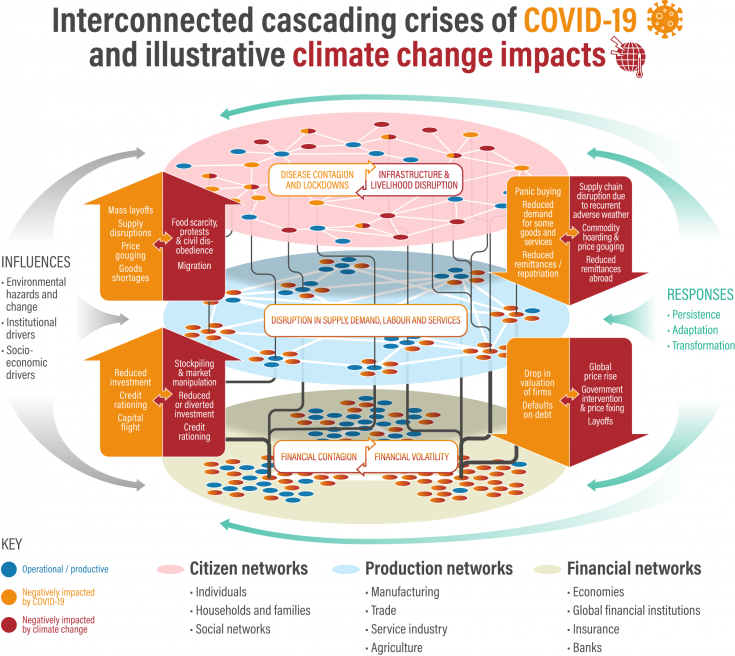What can COVID-19 teach us about preparing for climate risks in Europe?
High-impact and global crises like the current pandemic reveal our preparedness for disasters. COVID-19 has shown how difficult it can be to effectively respond to severe unprecedented disruptions. As our economies are struggling to adapt to the new normal, researchers are examining how we can learn from this systemic shock to increase societies’ resilience to future pandemics as well as worldwide disruptions, such as the climate crisis. RECEIPT, a H2020 project led by Deltares, is using novel scientific methods to foster preparedness.
Taking stock of COVID’s impact
COVID-19 and measures to slow its spread have had far-reaching impacts. With businesses shutting down or shifting to remote work, national lockdown measures and international travel bans, stakeholders from almost every economic sector suffered COVID-induced financial losses. Millions lost their job or informal sources of income, leaving many worried about paying their bills and rent. As a result, COVID-19 has also had significant social impacts.
The pandemic has worsened existing cultural and socio-economic inequalities. Low-income groups are less likely to be able to work from home. They often have less sick leave and poorer job protection. In many cases, they were the first to lose their jobs, and any employer-based health insurance. In addition, low-income groups are more likely to live in smaller homes, shared buildings and dense city areas. They also rely on public transportation more often. All of these existing disparities increased their risk of infection. Far from being the “great equalizer” some thought COVID would be, it has left already vulnerable groups even more vulnerable to the impacts of the pandemic.
Because our global systems are highly interconnected, impacts or measures in one country or sector also have consequences elsewhere. Containment measures, for example, created congestion in big ports, causing delays on shipping routes and making freight transport more unpredictable. Shipments were delayed and foods sometimes perished on the docks. A COVID outbreak at a transport company in China can thus lead to empty shelves in Poland.
COVID-19 has shown that authorities need to take informed and decisive actions to address a global disruption. Especially at the start of the pandemic, decision-makers lacked reliable and verifiable data to develop adaptation strategies. In many cases, it took time to figure out where one institution’s responsibility ended and another one’s began. Authorities also had to take into account the international impacts of their decisions, but often faced a lack of coordination. The pandemic has revealed the need for “ownership” and coordination for effective risk management.
Preparing for the climate crisis
The climate crisis shares similarities with the COVID-19 pandemic. While climate disruptions do not arise from a single event, their cumulative effects are likely to impact various sectors or systems at once and will have knock-on impacts around the world. As with COVID, these impacts will disproportionately affect vulnerable groups, reinforcing both local and global inequalities. For example, simultaneous crop failures following droughts in important production regions can drive up global food prices, triggering social displacement and causing unrest, thereby affecting local politics and international relations.
As with COVID, climate risk management often lacks clear ownership and cooperation. It remains unclear how responsibilities to identify, track and build resilience to climate risks are divided across institutions, both nationally and internationally. Much of the adaptation and mitigation efforts now start at the local level. Much-needed systemic, interconnected and internationally coordinated measures, however, have faced an uphill climb.
Good data
Any impactful response to climate change starts with good data. The way in which data is presented plays a massive role in how scientific findings are understood and integrated in decision-making. Scientists need to adapt how they present their data to their target audiences, their prior knowledge and the type of information they need. Urban practitioners, for instance, need high-resolution, localised data. While understanding that the global temperature might rise up to 4 or 5°C is important, this information is of little use to them if it is not translated into concrete consequences for their jurisdiction. This is why scientists should provide fit-for-purpose data that can readily be understood.
Data is nothing though, unless their meaning is properly translated into reality. That’s where simulation and visualisation tools can help. The Horizon 2020 RECEIPT project is developing scientific climate risk storylines that explore the impacts climate change around the world can have on Europe. RECEIPT researchers work with stakeholders in different sectors to co-create cause and effect chains to turn climate prediction data into storylines. To make those storylines more accessible to non-scientific audiences, RECEIPT is developing an interactive visualisation tool. This tool can present the long-term impacts of climate change in a more intuitive and compelling way. Keep an eye on the RECEIPT website to follow the project’s progress.
More information
RECEIPT, together with Horizon 2020 project CASCADES, has recently published a policy brief that provides more information about the lessons COVID-19 can teach decision-makers about climate preparedness. On 14th of April 2021, the two projects host a webinar for the EC services to reflect on the international (outside-Europe) dimensions of climate risks, also highlighted in the new EU Climate Adaptation Strategy.


